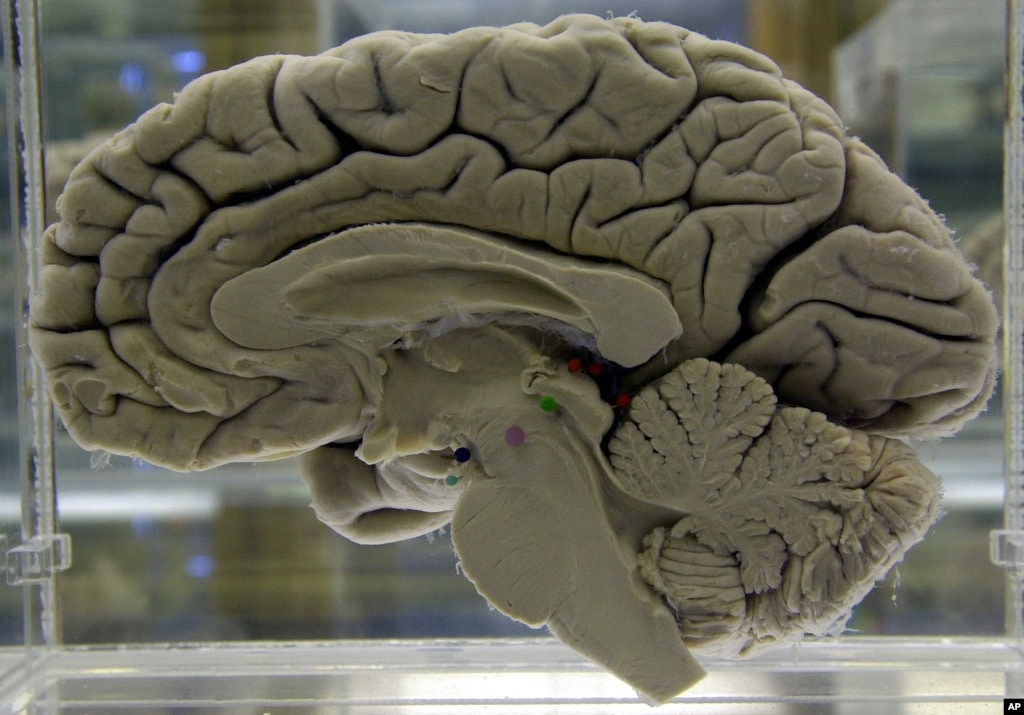
Hello and welcome to the VOA Learning English program Words and Their Stories. I’m Anna Matteo and today we are going to talk about the brain!
We all know what a brain is. A doctor will tell you that the brain is the organ of the body in the head. It controls our body’s functions, movements, sensations, emotions and thoughts.
But a brain can mean so much more.
A brain can also simply be a smart person. If a person is called brainy, she is smart and intelligent. If a family has many children but one of them is super smart, you could say, “She’s the brains in the family.”
And if you are the brains behind something you are responsible for developing or organizing something. For example, Bill Gates is the brains behind Microsoft.
A brain trust is a group of experts who give advice. Word experts say the phrase “brain trust” became popular when Franklin D. Roosevelt first ran for president in 1932. Several professors gave him advice on social and political issues facing the U.S. These professors were called his "brain trust."
These ways we use the word “brain” all make sense. But other ways we use the word are not so easy to understand.
For example, to tease is to make fun of someone. But a brainteaser is not one who makes fun of someone else’s brain. A brainteaser is a riddle or puzzle that makes you think. Here is a fun brainteaser: What can go all around the world but still stays in one corner? The answer – a stamp! You can share that brainteaser with your friends.
To understand the next brain expression you first need to know the word “drain.” As a verb, to drain means to remove something by letting it flow away. So, a brain drain may sound like a disease where the brain flows out the ears. But, brain drain is when a country’s most educated people leave their countries to live in another. The brains are, sort of, draining out of the country.
Next, we have a brainchild. A brainchild sounds like a really smart kid. But it isn’t. A brainchild is an idea that one has without any help from others. If you have a really great idea, it is your brainchild – no one else’s.
However, if many people are responsible for a great idea, you could say they brainstormed it. Here, brainstorm is not an act of weather. It is a process of thinking creatively about a complex topic. For example, business leaders may use brainstorming to create new products, and government leaders may brainstorm to solve problems.
But if you can’t find a solution to a problem, or if you can’t even remember what the problem is, you may have to rack your brains. This expression means to think very hard about something.
To pick someone’s brain is quite different. For example, if you meet someone who knows a lot about a subject you like, you may want to pick his brain to learn more.
But do not mix these expressions up! You cannot rack someone else’s brain or pick your own.
Now, if people are brainwashed it does not mean their brains are nice and clean. To brainwash means to make someone accept new beliefs by using repeated pressure in a forceful or tricky way. Keep in mind that brainwash is never used in a positive way.
And that’s all for this week’s Words and Their Stories. If you have Words and Their Stories on the brain that means you cannot stop thinking about it. Don’t worry. There are more shows on our website.
I’m Anna Matteo.
Anna Matteo wrote this “Words and Their Stories.” Kelly Jean Kelly was the editor. The “Brain Song” heard at the end of the program is from StoryBots.





